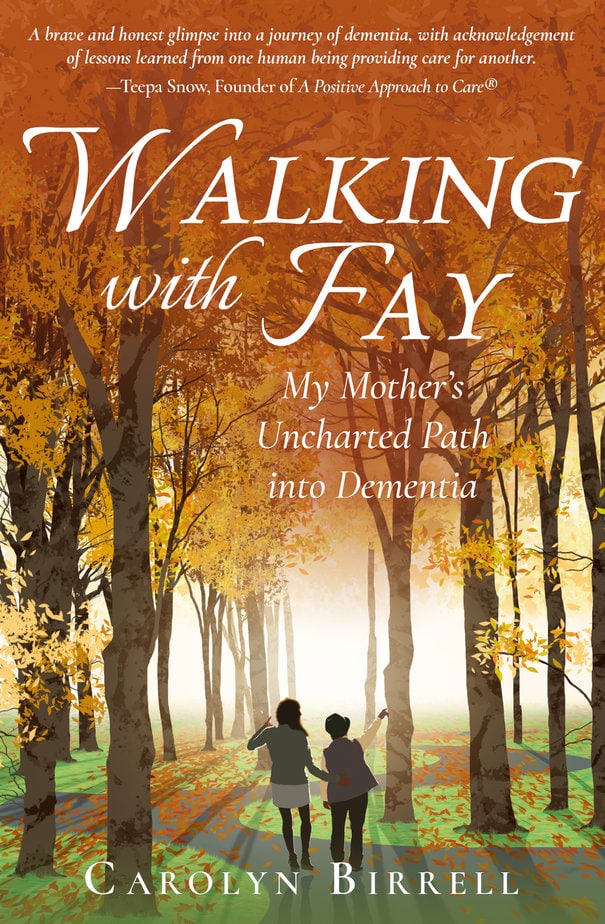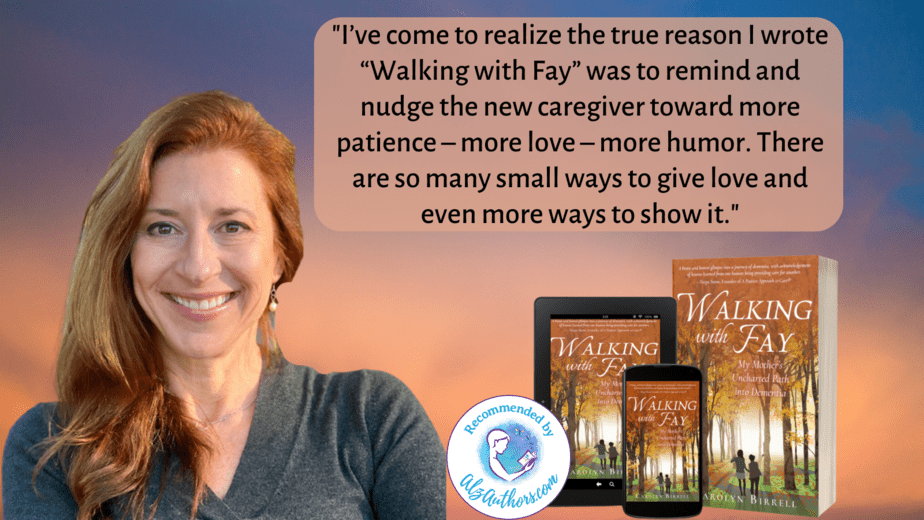By Carolyn Birrell
“In 2012, I flew down to Georgia to kidnap my mother.”
That’s how my book begins. Impactful, solid hook. I’m told it’s a powerful read, full of relatable stories and helpful tips. What I’ve come to realize, though, is that dementia has this uncanny knack of choosing the unsuspecting and ill-prepared. Ask any new caregiver and they’ll likely tell you that nothing is more “impactful” than dementia in real-time – when that “solid hook” sets itself deeply into your lip.
 What I’m trying to say is, until you’ve walked in the shoes of a dementia caregiver, the writing is just a story that needs to be told. Reading it is helpful, no doubt. It’s why we’re here, the writers of these powerfully emotional and incredibly raw books that will hopefully guide and encourage those trailing behind us on this uncharted path we’ve found ourselves on. We know there’ll be times when you’ll want to leap off course, charging in the opposite direction to escape the torturous daily changes you’ve been (or soon will be) witnessing from your loved one. How many times did I?
What I’m trying to say is, until you’ve walked in the shoes of a dementia caregiver, the writing is just a story that needs to be told. Reading it is helpful, no doubt. It’s why we’re here, the writers of these powerfully emotional and incredibly raw books that will hopefully guide and encourage those trailing behind us on this uncharted path we’ve found ourselves on. We know there’ll be times when you’ll want to leap off course, charging in the opposite direction to escape the torturous daily changes you’ve been (or soon will be) witnessing from your loved one. How many times did I?
And how many times do I wish now that I could go back? What would I give to change that one regretful interaction (or three) I had with my mother? Those times when I was so busy being taskmaster and savior-from-small-catastrophes that I forgot to laugh? Or when I acted loving but felt anything but that? It was only when I truly saw my mother for the frightened, confused person she was, that I was filled with genuine love, and it’s those memories I cling to now.
She died during the beginning of the Pandemic, when care facilities were grappling with protocol and quarantines. I broke some rules to see her, so unlike the obedient daughter she raised, but I got to be with her when she left. And for that, I’m grateful. Too many people during COVID weren’t so lucky – those who died and those who loved them.
I’ve come to realize the true reason I wrote “Walking with Fay” was to remind and nudge the new caregiver towards having more patience – more love – more humor. There are so many small ways to give love and even more ways to show it. And dementia or not, they know. They hear it in your voice. They see it in your expressions. I originally thought I wrote it to prepare others for their journey, and I did accomplish that. But it was the “after” that was hardest on me – and the thing I’d most like to help others realize they’re able to change while they’re still walking on this path.
Purchase “Walking with Fay” on Amazon.com, BarnesandNoble.com, and anywhere you buy books online. Ask your local library to stock it! I’d love to hear from you via my “Contact Me” on my website’s home page at www.carolynbirrell.com, or you can find me on Facebook, Instagram, and LinkedIn.
About the Author
 Carolyn Birrell retired to Bonners Ferry, ID, after having spent 20 years in Atlanta, GA, where she worked for the American Cancer Society National Headquarters and then as a real estate agent. Soon after her move, she relocated her aging mother to be near her and spent the next eight years caring for her while learning “all things dementia.” She began writing initially to help her make sense of her mother’s early-stage dementia and the terrifying behaviors that came with it. It didn’t take her long to realize she’d been writing the very book she’d been searching for – the one that not only tells one woman’s story of traveling down her mother’s path into dementia from its beginning to its inevitable end, but also helps others who are struggling to keep pace with their own loved one and desperately needing help. These days you can usually find her pulling weeds, plucking strings on her ukulele, or on her paddleboard.
Carolyn Birrell retired to Bonners Ferry, ID, after having spent 20 years in Atlanta, GA, where she worked for the American Cancer Society National Headquarters and then as a real estate agent. Soon after her move, she relocated her aging mother to be near her and spent the next eight years caring for her while learning “all things dementia.” She began writing initially to help her make sense of her mother’s early-stage dementia and the terrifying behaviors that came with it. It didn’t take her long to realize she’d been writing the very book she’d been searching for – the one that not only tells one woman’s story of traveling down her mother’s path into dementia from its beginning to its inevitable end, but also helps others who are struggling to keep pace with their own loved one and desperately needing help. These days you can usually find her pulling weeds, plucking strings on her ukulele, or on her paddleboard.
Connect with Carolyn



2 Responses
I know Carolyn personally, and knowing her has been a delight. In “Walking with Faye”, this delight shines through. The honesty, transparency, the life, and…well, the love…reading this book will leave you feeling like you, too, know Carolyn AND Fay – two very real people with a very real, increasingly common yet uncommon story to tell; a story that they tell “Delight”fully.
Thank you, Scott. You live this every day, and it makes me happy to know that my story may have helped, even a little.